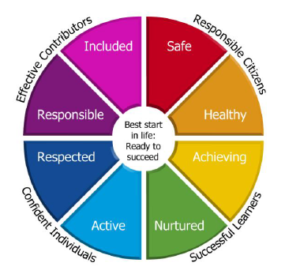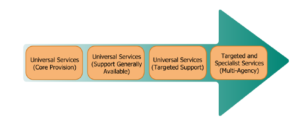Getting it Right for Every Child
Getting It Right For Every Child(GIRFEC) is the national policy approach in Scotland which aims to support the wellbeing of all children and young people, by offering the right help, at the right time, from the right people. Certain aspects of this policy have been placed in law by the Children and Young People (Scotland) Act 2014.
Wellbeing of children and young people sits at the heart of the Getting it Right for Every Child approach. Eight Wellbeing Indicators shown below, outline the aspirations for all Scotland’s children and young people.
The Getting It Right approach means services will work in partnership with children, young people and their parent/carer(s) and we want every child at Fishermoss School to feel happy, safe and supported to fulfil their potential.
The approach gives a common language and a way to gather information about a child’s world, making sure the child is growing and developing, and has everything they need from the people who look after them both at home and in the wider community. It also encourages practitioners to think about other professionals who might need to be involved to ensure that all the child’s needs are being met.
The Named Person
Prevention and early-intervention are seen as key to the Getting It Right approach in achieving positive outcomes for children and young people. By providing support at an early stage, most difficulties can be prevented from escalating.
One way the Scottish Government has decided this should be taken forward, is by making a Named Person available to every child and young person in Scotland. The Education Service provides the Named Person Service for all children on entry to Primary One, until aged 18 (or beyond where a young person remains at secondary school). In Aberdeenshire the Named Person will be either the Primary Head Teacher or Deputy Head Teacher and in Secondary School, the Named Person will be that young person’s allocated Principal Teacher of Guidance (with a few exceptional circumstances).
The purpose of the Named Person role is to make sure children, young people and parents have confidence that they can access help or support no matter where they live or what age the child is. Acting as a central point of contact, the Named Person can help children, young people or parents/carers get the support they need, if and when they need it.
The Named Person can help by:
- Providing advice, information or support
- Helping a child, young person, or parent/carer to access a service or support
- Discussing or raising a wellbeing concern about a child or young person.
There is no obligation for children and young people or parents to accept any offer of advice or support from the Named Person. Non-engagement with a Named Person is not in itself a cause for concern.
For more information you can contact your child or young person’s Named person directly, or go to:
http://www.girfec-aberdeenshire.org/for-parents-carers/what-is-the-named-person/
Here at Fishermoss School the named person for your child is the Head Teacher.
Educational Psychology
Educational psychologists are trained to work in collaboration with school staff, parents and other professionals to help children and young people to achieve their full potential. They use psychological skills and knowledge to improve the learning and wellbeing of all children and young people and offer schools a range of services including consultation, assessment, intervention, research, project work as well as support for staff’s professional learning and development.
http://aberdeenshire.gov.uk/schools/eps/
Enhanced Provision & Community Resource Hubs
Aberdeenshire Council is committed to supporting children and young children to be educated in local schools through providing the right support in the right place at the right time. By enhanced provision we mean that a local primary and secondary school has an enhanced level of resources, such as access to a sensory room and life skills area; and support for learning staff who have an enhanced level of expertise to meet a range of needs.
Further enhancement is available through the community resource hub, for a small minority of children with severe and complex needs, who regardless of chronological age are making very small steps in learning and are at the early levels of learning. The enhanced provision centres and community resource hubs can offer outreach support to mainstream schools, short term assessment placements, flexibility (e.g. blended places) and access to a variety of therapies.
For more information on all of our resources and policies go to:
Support for Learning
There are times when pupils may experience challenges with their schoolwork. This can be for a variety of reasons including specific learning difficulties, challenges with specific subjects, general learning difficulties or a period of absence.
Each school cluster has an allocation of Teachers of Additional Support for Learning (ASL) who are employed to support pupils with additional support needs. They work across each cluster in primary and secondary with the main aims of identifying and assessing (with others) barriers to learning, and in partnership with appropriate practitioners and parents, address these needs through a relevant curriculum. Pupil Support Assistants (PSA) assist teachers in promoting achievement and raising the standards of pupil attainment and provide general ‘hands-on’ support in relation to the needs of the class and individuals’ care, health and wellbeing and safety and to ensure a secure and safe environment.
The Child’s Plan
The Getting It Right approach makes sure children and young people are provided with a range of support, which is proportionate and put in place to meet assessed need. This is reflected in Aberdeenshire’s staged approach to assessment and planning for individual children and young people, shown below.
For a small minority of children or young people, there might be higher levels of need or risk identified. These children may require a level of targeted support, coordinated on a single or multi-agency basis through a Child’s Plan.
Where a child or young person needs one or more targeted interventions, the benefit of a Child’s Plan will be discussed with them and their parents/carers. An assessment would identify any affected wellbeing indictors (Safe, Healthy, Active, Nurtured, Achieving, Resected, Responsible, Included), looking at both strengths and pressures in the child’s situation, and fully involving the family in discussions.
The Child’s Plan will outline what action will be taken by the child, their family and professionals, and detail how these supports aim to help improve the child or young person’s Wellbeing and overcome any difficulties.
A Lead Professional will help to co-ordinate and manage any Child’s Plan.
Information is available on the Aberdeenshire Getting It Right Website:
http://www.girfec-aberdeenshire.org/for-parents-carers/
Child Protection
Child Protection is everyone’s responsibility. Protecting children and young people is the responsibility of every member of the community.
Within Fishermoss School we have a designated member of staff appointed to be responsible for Child Protection matters. If there is the possibility that a child could be at risk, the school is required to refer the child to Social Work, the Police or the Children’s Reporter. Here at Fishermoss School the designated officer is: Margaret Ferguson, Head Teacher, supported by Dawn Anderson Depute Head and Kirsten Brown, Additional Support for Learning Teacher.
Remember – if you suspect abuse, do not rely on someone else to notice.
If you would like to speak to someone, seek help or pass on information or concerns:
Social Work Monday to Friday during office hours contact your Children & Families local Social Work Office
Evenings & Weekends call the Out of Hours Service on 03456 08 12 06
Police Emergency 999, Non-Emergency 101
Signs of abuse can range from poor personal hygiene and hunger to unexplained injuries or self-harm.
If a young person tells you they are being abused:
- stay calm and listen to them
- never promise to keep it a secret – tell them you must let someone else know
- remind them that they are not to blame and are doing the right thing
- report it, but leave any investigation to child protection agencies
Protecting Aberdeenshire’s children and young people is everyone’s business, go to:
http://www.girfec-aberdeenshire.org/child-protection/
Further Information on Support for Children and Young People
The following websites may be useful:
Getting It Right For Every Child (GIRFEC)
http://www.girfec-aberdeenshire.org/
Aberdeenshire Council
http://www.aberdeenshire.gov.uk/schools/additional-support-needs/
Support for All
https://www.education.gov.scot/scottish-education-system/Support%20for%20all
Enquire


